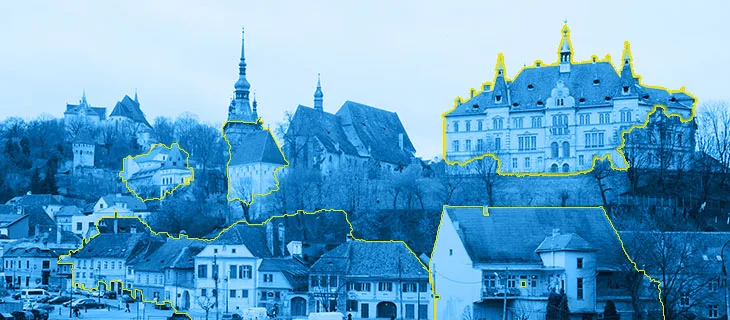Romania and Bulgaria Join Schengen Area: What it Means for Digital Nomads

As of March 31, 2024, Romania and Bulgaria join Schengen Area, removing border controls between the now 29 countries.
This is excellent news for EU nationals and the European economy, but what does this mean for digital nomads who would stay in these countries and wait to return to the Schengen Area?
Now that Romania and Bulgaria join Schengen Area, EU nationals and those with Schengen visas (including tourist visas) can move freely between the bloc without going through passport control when crossing the borders.

What is the Schengen Area?
The Schengen Area consists of 29 countries in Europe that allow free movement between them, which means there are no border control checks for your passport.
As of today, the Schengen Area includes the following countries:
- Austria 🇦🇹
- Belgium 🇧🇪
- Bulgaria 🇧🇬
- Croatia 🇭🇷
- Czech Republic 🇨🇿
- Denmark 🇩🇰
- Estonia 🇪🇪
- Finland 🇫🇮
- France 🇫🇷
- Germany 🇩🇪
- Greece 🇬🇷
- Hungary 🇭🇺
- Iceland 🇮🇸
- Italy 🇮🇹
- Latvia 🇱🇻
- Liechtenstein 🇱🇮
- Lithuania 🇱🇹
- Luxembourg 🇱🇺
- Malta 🇲🇹
- Netherlands 🇳🇱
- Norway 🇳🇴
- Poland 🇵🇱
- Portugal 🇵🇹
- Romania 🇷🇴
- Slovakia 🇸🇰
- Spain 🇪🇸
- Sweden 🇸🇪
- Switzerland 🇨🇭
Third-country nationals can stay in the Schengen Area for 90 days out of a 180-day period. So, this means that you can stay in any of the countries listed above for a total of 90 days.
You may not stay in Italy for 90 days and then in France for the next 90 days. This would result in overstaying your tourist visa.
After you have spent 90 days in the Schengen Area, you must leave for at least 180 days before returning.

What Does this Mean for Digital Nomads That Romania and Bulgaria Join Schengen Area?
As Romania and Bulgaria join the Schengen Area, digital nomads feel a bit lost with their travels. These two countries were once havens for digital nomads waiting to reenter the Schengen Area after their 90-day tourist allowance ended.
The same was true for Croatia before they joined Schengen in January 2023.
Now, digital nomads must opt to stay in other countries that are outside the growing Schengen Area. Some popular destinations that meet this criteria include:
- Montenegro 🇲🇪
- Bosnia and Herzegovina 🇧🇦
- Georgia 🇬🇪
- Serbia 🇷🇸
- Albania 🇦🇱
- Turkey 🇹🇷
- Cyprus 🇨🇾
Digital nomads can still experience the European vibes in these countries while staying out of the Schengen Area.

How Digital Nomads Can Stay in Schengen Area for One Year or More
Over the last couple of years, countries in the Schengen Area have introduced digital nomad visas, allowing remote workers to temporarily reside abroad. Some of these digital nomad visas can actually lead to permanent residency too.
Applicants meeting certain income, remote experience, and nationality requirements may apply for these European digital nomad visas and have the ability to stay in the Schengen Area for more than 90 days at a time.
What Countries in the Schengen Area Have a Digital Nomad Visa?
The current countries in the Schengen Area that offer a digital nomad visa that allows remote workers to reside in the country for at least a year include:
- Croatia 🇭🇷
- Czech Republic 🇨🇿
- Estonia 🇪🇪
- Greece 🇬🇷
- Hungary 🇭🇺
- Iceland 🇮🇸
- Italy 🇮🇹
- Latvia 🇱🇻
- Malta 🇲🇹
- Portugal 🇵🇹
- Romania 🇷🇴
- Spain 🇪🇸
When you apply for a digital nomad visa in one of these countries, many require you to be present for at least six months out of the year. For the rest, you can freely travel the Schengen Area.

Apply for a Digital Nomad Visa with Professional Assistance
If your dream is to experience a European lifestyle and stay in the Schengen Area for more than 90 days at a time, then a digital nomad visa could be right for you!
Applying for visas can be complicated, especially when it comes to navigating complicated bureaucracy.
That’s why Nomads Embassy has partnered with hand-selected local immigration lawyers to provide a Done-for-You Digital Nomad Visa service. Simply gather your documents, attend your visa appointment, and follow your personal lawyer’s instructions.
It’s never been simpler to apply for a digital nomad visa in the Schengen Area.
To get started, request Nomads Embassy’s free digital nomad visa eligibility assessment today!
You may also enjoy

Do you dream of living and working remotely from Sri Lanka for a year? See if you can with our free Sri Lanka digital nomad visa eligibility check! Simply answer…
by Brittany

Are you planning to apply for the Portugal digital nomad visa? Then you’ll want to read about the new eligibility changes and Portugal digital nomad visa updates for 2026. Each…
by Brittany

Do you dream of living and working remotely from Bulgaria up to two years? See if you can with our free Bulgaria digital nomad visa eligibility check! Simply answer the…
by Brittany
